|
|
|
Sort Order |
|
|
|
Items / Page
|
|
|
|
|
|
|
| Srl | Item |
| 1 |
ID:
134170
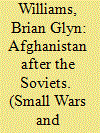

|
|
|
|
|
| Publication |
2014.
|
| Summary/Abstract |
In 1989 the Soviet Union withdrew its forces from Afghanistan leaving the embattled Afghan Communist government of President Mohammad Najibullah to fight against an emboldened mujahideen insurgency. Most experts expected a quick mujahideen victory once the Soviets were no longer directly involved in counterinsurgency operations in support of the Afghan government. But in the spring of 1989 the Afghan Communists beat the odds and defeated a mujahideen rebel offensive designed to capture the eastern city of Jalalabad. This proved to be a turning point, and for the next three years the Najibullah regime held out against the mujahideen 'freedom fighters'. In fact the Afghan Communist regime actually outlasted its sponsor the Soviet Union. The reasons for this remarkable achievement can be traced, in part, to ethnic-tribal divisions among the quarreling mujahideen parties and the Afghan government's ability to exploit them. This largely untold story has obvious implications for understanding the future of post-Karzai Afghanistan, tribalism, ethnicity, and foreign sponsorship in post-US Afghanistan. This article will explore the reasons for the resilience of the Najibullah Communist government and then assess possible implications for a post-2014 Afghan government.
|
|
|
|
|
|
|
|
|
|
|
|
|
|
|
|
| 2 |
ID:
045807
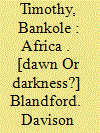

|
|
|
|
|
| Publication |
BlanndFord, Davison Publishing Limited, 1976.
|
| Description |
x, 170p.hbk
|
| Standard Number |
0904130088
|
|
|
|
|
|
|
|
|
|
|
|
Copies: C:1/I:0,R:0,Q:0
Circulation
| Accession# | Call# | Current Location | Status | Policy | Location |
| 016226 | 960.32/TIM 016226 | Main | On Shelf | General | |
|
|
|
|
| 3 |
ID:
031952
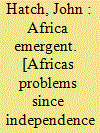

|
|
|
|
|
| Publication |
London, Secker and Warburg, 1974.
|
| Description |
ix, 233p.hbk
|
| Standard Number |
436191261
|
|
|
|
|
|
|
|
|
|
|
|
Copies: C:1/I:0,R:0,Q:0
Circulation
| Accession# | Call# | Current Location | Status | Policy | Location |
| 014981 | 960.326/HAT 014981 | Main | On Shelf | General | |
|
|
|
|
| 4 |
ID:
092662
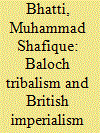

|
|
|
| 5 |
ID:
185913
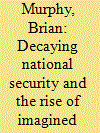

|
|
|
|
|
| Summary/Abstract |
In an era where the exchange of information has been radically transformed by new technologies, Brian Murphy argues that states should no longer be considered the imagined communities that underpin dominant concepts of national security. He contends that national security experts should think in terms of ‘imagined tribes’ instead.
|
|
|
|
|
|
|
|
|
|
|
|
|
|
|
|
| 6 |
ID:
122535
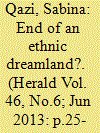

|
|
|
| 7 |
ID:
179478
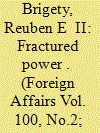

|
|
|
|
|
| Summary/Abstract |
When the United States looks abroad to assess the risk of con4ict, it relies on a host of
tools to understand other countries’ social and political divisions and how likely
they are to result in unrest or violence.
|
|
|
|
|
|
|
|
|
|
|
|
|
|
|
|
| 8 |
ID:
190978
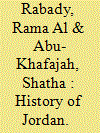

|
|
|
|
|
| Summary/Abstract |
The history of Jordan is an epistemological construction of the colonial past with Biblical archaeology at its core. At the same time, vernacular heritage is addressed by many foreign scholars as decaying, disappearing and accidental. This article takes issue with the foreign Biblical formation of the past and introduces local heritage-making as part of a decolonising construction. We debate the historical continuity of Biblical epistemology whilst proclaiming vernacular heritage as an accidental reality that is irrelevant to the ancient past. Local communities are introduced as active knowledge agents whose understanding of, and approach to, vernacular heritage can shift the epistemological debate on Jordan’s history and its relevance to the present and the future. This argument is anchored in case studies of the Biblical archaeology of Hisban and the local village of Gharisa, to investigate how each one functions in the absence/presence of the other. The comparison shows that while the Biblical epistemology applied in the case of Hisban precipitated a version of Jordan's history based on a spatio-political pattern of tribalism, local knowledge advanced a logic of modern history that included vernacular heritage as a link between the ancient past and the uncertain present and future in Jordan, and using Arabism, as opposed to tribalism, as a unifying framework.
|
|
|
|
|
|
|
|
|
|
|
|
|
|
|
|
| 9 |
ID:
115086
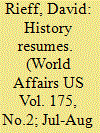

|
|
|
|
|
| Publication |
2012.
|
| Summary/Abstract |
The influence of sectarianism in politics is about as welcome a topic among policymakers as the drunken uncle or the drug addict son is at the family dinner table. Indeed, a strong case can be made that it is because policymakers in powerful countries, above all in the United States and Western Europe, within the UN system, especially in the departments of political affairs and peacekeeping, and at the World Bank and the IMF, tend to craft their strategies and make their decisions as if sectarianism were a minor concern rather than the central one that it has always been in most parts of the world, that, like a sort of Philosopher's Stone in reverse, it has turned so many supposed geostrategic sure things into either disappointments or outright failures.
|
|
|
|
|
|
|
|
|
|
|
|
|
|
|
|
| 10 |
ID:
173269
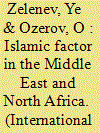

|
|
|
|
|
| Summary/Abstract |
THE "LIMINALITY" and "re-lslamization" phenomena1 caused by the split in the ranks of the Islamic theological elite into the moderate majority (minimalists) and radically minded minority (maximalists) [Waghid. 2011:5-8] came to the fore in some of the North African Arab countries and in many sub-Saharan countries with considerable Islamic populations. Radicalization of apart of the Islamic political elite betrays itself in a much greater political and military activity of Muslim maximalists and a much wider scope of activities of extremist Islamic organizations.
|
|
|
|
|
|
|
|
|
|
|
|
|
|
|
|
| 11 |
ID:
170723
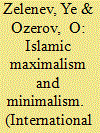

|
|
|
| 12 |
ID:
142530
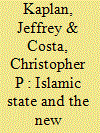

|
|
|
|
|
| Summary/Abstract |
This article focuses on the apocalyptic zeitgeist of the Islamic State through the lens of what we call the New Tribalism. It finds that IS emerged from the Al Qaeda (AQ) milieu, but soon split with AQ as the messianic excitement surrounding Al-Baghdadi and his teachings grew. In common with previous millennial/messianic movements in all three “Peoples of the Book”—Judaism, Christianity, and Islam—IS soon evolved beyond the laws of the normative faith (antinomianism). We hold that for this reason, despite its claims of faith and fealty, IS has left the Islamic Umah behind, becoming a malign sectarian group of its own whose dynamism and successes are attracting a global audience and support from Muslims in almost every country. This helps to explain such abhorrent practices as forced conversion, sexual servitude, the destruction of historic artifacts, and mass executions. We find that the American invasion of Iraq was the vital first step in a series of events, which gave birth to IS. A thorough review of IS history and political culture traces these historic moments in time.
|
|
|
|
|
|
|
|
|
|
|
|
|
|
|
|
| 13 |
ID:
157578
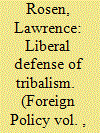

|
|
|
| 14 |
ID:
120298
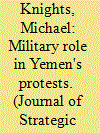

|
|
|
|
|
| Publication |
2013.
|
| Summary/Abstract |
Saleh's solution to 'the civil-military problematic' (to borrow Peter Feaver's phrase) was to build powerful praetorian units and place his relatives in command of them, a counter-productive approach that ultimately increased the risk that Saleh faced. During Yemen's Arab Spring uprisings, sections of the armed forces not controlled by President Ali Abd'allah Saleh's siblings and cousins sought to ride the wave of popular revolt and emerge as a cohesive power-base in the post-Saleh period. To achieve these aims the military establishment made a conscious effort to let the tribes and civil society activists lead the assault on the Saleh government.
|
|
|
|
|
|
|
|
|
|
|
|
|
|
|
|
| 15 |
ID:
099468


|
|
|
| 16 |
ID:
072275
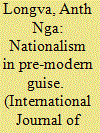

|
|
|
|
|
| Publication |
2006.
|
| Summary/Abstract |
The duality of nomad/sedentary or nomads/settlers-in Arabic badu/hadhar-is a classic feature of the social history of the Middle East. Related to this duality is the notion of tribe and its cultural ideology, tribalism. These are all concepts familiar to the students of the region, although increasingly, they are acquiring an antiquated character due to rapid urbanization and other forms of socioeconomic change. In the Arabian Peninsula, the dichotomy is still widely used. Whereas important research has been carried out over the years on the relationship between tribalism and nationalism in the Middle East, the persistence of this particular dichotomy in the Gulf has received little analytical attention. Many studies on the region speak of "bedouin" as groups, constituencies, or social or political actors, without clarifying what lies in the term and without asking by what criteria this category is defined or how it differs from other, non-bedouin categories. The association of bedouinism/tribalism with the Arabian Peninsula, "home of all the Arab tribes," is so deeply anchored in the imagination of both inhabitants and outsiders that to speak of Arabian bedouin in the late 1990s to early 2000s hardly raised any eyebrows. On closer observation, however, one has to acknowledge the growing lack of consonance between the original lexical meaning of the term bedouin (pastoral nomads) and its derivative meaning ("country" as opposed to "city," or "primitive" as opposed to "civilized") and the category to which it is purported to apply. Both meanings beg the question of why the hadhar-badu dichotomy has such a central place in Kuwaiti popular discourse-Kuwait being for all purposes a city-state with hardly any country and where "the rural areas" is a euphemism for the sprawling suburbs around the capital city. At the same time, official history tells us that Kuwait was founded by bedouin who had fled drought and famine from Central Arabia in the first half of the 18th century. Under these circumstances, what does it take to qualify as a badu or to disqualify as a hadhar in present-day Kuwaiti society? There is one more thing: far from slipping into oblivion as a result of urbanization, the hadhar-badu dichotomy has made a noticeable comeback in popular discourse over the past two decades. This article seeks to explain the present popular concern in Kuwait with a dichotomy whose analytical, if not historical, validity has often been questioned. It explores the reasons why important symbolic barriers are being raised between hadhar and badu that contribute to turning them into mutually exclusive identities. Throughout history, hadhar and badu have always been porous categories and the distinction was never clear, regardless of what the ongoing discourse may claim. Even today, ascription and self-ascription of badu and hadhar identities are contextual rather than absolute; they are also contested, more often than not. The first task at hand is to clarify the meaning of hadhar and badu in Kuwait and their use at the turn of the millennium. The article, thus, begins by pinpointing the social groups that these categories encompass and by giving a brief description of each group's stereotypes of the other. Through the description of Kuwaiti social practices in relation to marriage and the use of surnames, and the exploration of the pervasive role of the state, I hope to show that social reality in Kuwait is a lot more complex than the discourse of polarization suggests. Finally, it is argued that, to explain the revival of the dichotomy, we need to understand the ongoing hadhar criticism of the badu as an expression of anti-immigration feelings, of the kind one commonly hears in societies where the state has pledged to take in charge the cradle to grave welfare of its citizens. A parallel with anti-immigration discourse in Western European welfare-state nations is drawn up as an argument against an exclusively historical-cultural interpre
|
|
|
|
|
|
|
|
|
|
|
|
|
|
|
|
| 17 |
ID:
148824
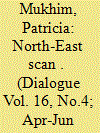

|
|
|
|
|
| Summary/Abstract |
It was interesting to read the recent exhortations of Mr. Isak Swu, Chairman, National Socialist Council of Nagalim (IM). Mr. Swu was greeting the people on the 36th Republic Day of the Nagas. The NSCN (IM) leadership has indulged in semantics for decades. Isak Swu and Th Muivah have perfected the art of diplomatic discourse while engaging with “India.” Now they use the same language to address their own people. Swu mentioned Naga psychology which he said has to be refurbished. He also said that tribalism, communalism and factionalism are the weapons of enemies of the people. Swu probably implies that the three ‘isms’ have been used by enemies of the Nagas to defeat their cause.
|
|
|
|
|
|
|
|
|
|
|
|
|
|
|
|
| 18 |
ID:
143209
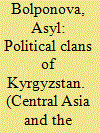

|
|
|
|
|
| Summary/Abstract |
The author traces the history of the clan system and its evolution as part of the political processes unfolding in Kyrgyzstan. She relies on facts to demonstrate that the clan system of our days is a product of classical unification of tribes into clans.
|
|
|
|
|
|
|
|
|
|
|
|
|
|
|
|
| 19 |
ID:
091991
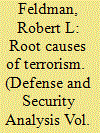

|
|
|
|
|
| Publication |
2009.
|
| Summary/Abstract |
Optimistic outlooks have frequently been posited for Africa, often perfaced with statements that all that is needed is better governance,free markets, an end to corruption, or some other reform that is easy to say but all-too-often nearly impossible to implement.The unfortunate truth is that it is possible some parts of Africa may never be at peace.
|
|
|
|
|
|
|
|
|
|
|
|
|
|
|
|
| 20 |
ID:
156629
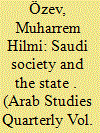

|
|
|
|
|
| Summary/Abstract |
This article considers religious, social, political, and economic dimensions of the
Saudi-Wahhabi state imagination. Since the inception, the Saudi state has relied on two
main pillars: the monarchy and Wahhabism, which have been in a symbiotic relationship.
In time, the state imagination in Saudi Arabia has been determined and reconstructed
by factors like Wahhabism, monarchism, rentierism, internal and international political
and economic obligations, and modernization efforts imposed by being a “nation state.”
Those factors made Saudi Arabia a sui generis state. The legitimacy of the monarchy has
been ensured through tribalism and, on a larger scale, religion. Foreign aid, booties, oil
revenues, and, on a rather insignificant scale, tax revenues have created a material infrastructure
to build citizenship.
|
|
|
|
|
|
|
|
|
|
|
|
|
|
|
|
|
|
|
|
|